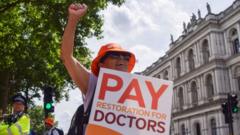Can Health Secretary and BMA Strike a Deal to Prevent Walkouts?

Understanding the Current Strike Situation in England's NHS: A Comprehensive Overview
In England, the National Health Service (NHS) is facing a potential disruption as resident doctors, formerly known as junior doctors, have announced plans to strike for five consecutive days from July 25 to July 30. This decision stems from ongoing disputes with the government regarding pay and working conditions. Health Secretary Wes Streeting is set to engage in talks with the British Medical Association (BMA) next week in hopes of averting this strike action. With the NHS already operating under immense pressure, the implications of these strikes could further complicate an already challenging healthcare landscape.
The Background of the Dispute
The current conflict centers around pay disputes, particularly in light of the recent 5.4% pay rise awarded to resident doctors. While this increase is a step forward, many argue it does not adequately address the erosion of their real-term salaries. Since 2008, resident doctors claim their pay has declined by approximately 20%, despite previous increases. This ongoing discrepancy has prompted the BMA to demand a clear pathway for restoring their salaries to a more equitable level.
The Government's Position
The government has asserted that it cannot improve its current offer beyond the 5.4% increase. Health Secretary Wes Streeting has described the strike as "unnecessary and unreasonable," highlighting the precarious state of the NHS. He has emphasized the importance of maintaining progress in reducing waiting lists and providing adequate patient care, suggesting that further strikes could jeopardize these efforts.
The BMA's Stance
The BMA, representing the interests of resident doctors, has indicated that strikes will only be called off if next week’s negotiations yield an offer that can be presented to its members. Co-chairs Dr. Melissa Ryan and Dr. Ross Nieuwoudt have stated that they felt they had "no choice" but to strike due to the lack of a credible offer from the government. This sentiment resonates with many within the medical community who feel undervalued and undercompensated for their work.
Impacts of the Strike
Should the strike proceed as planned, the ramifications for the NHS could be significant. The health service is already stretched thin, and additional strikes may exacerbate existing challenges, including:
- Increased Waiting Times: With resident doctors walking out, elective procedures and routine appointments could be postponed, leading to longer wait times for patients.
- Staff Morale: Continuous strike actions may lower morale among healthcare professionals, further complicating recruitment and retention efforts.
- Public Trust: Ongoing disputes and strikes could erode public confidence in the NHS, which relies heavily on the trust of the community it serves.
Salary Breakdown for Resident Doctors
To better understand the financial context of this dispute, it is essential to take a closer look at the salary structure for resident doctors in England. Basic salaries for resident doctors range from £37,000 to £70,000 annually for a standard 40-hour workweek. The following factors can affect total compensation:
- Experience: Salaries increase with experience, reflecting the growing expertise and responsibility of resident doctors.
- Additional Shifts: Extra payments are available for working night shifts, weekends, and other unsociable hours.
- Recent Pay Awards: The recent 5.4% pay increase will be reflected in pay packets starting in August, but many argue that it does not adequately compensate for past losses.
The Reaction from the Medical Community
The impending strike action has sparked varied responses within the medical community. Notably, Lord Robert Winston, a distinguished professor and a pioneer in the field of IVF, publicly resigned from the BMA due to the planned strikes. He has voiced concerns that strike actions could damage public trust in the medical profession, emphasizing the delicate balance healthcare professionals must maintain with the public they serve.
Conclusion: What Lies Ahead for the NHS?
As talks between Health Secretary Wes Streeting and the BMA approach, all eyes are on the outcome. The potential for a strike poses serious questions regarding the future of the NHS and its ability to provide quality care to patients. It is evident that the conflict extends beyond mere salary disputes; it encompasses the broader issues of working conditions, staff morale, and the overall sustainability of the NHS.
Ultimately, the resolution of this conflict will hinge on the government’s willingness to engage in meaningful dialogue and provide a credible offer to resident doctors. The stakes are high, not only for healthcare professionals but also for the millions who rely on the NHS for their health care needs. Will the upcoming negotiations yield a solution that satisfies both parties, or are we witnessing the beginning of a more extensive series of strikes within the NHS?
FAQs
What is the role of resident doctors in the NHS?
Resident doctors, formerly known as junior doctors, are medical professionals in training who provide essential healthcare services, often working long hours and handling various patient care responsibilities.
How does the salary of resident doctors compare to other healthcare professionals?
The salary of resident doctors varies based on experience, but they typically earn between £37,000 and £70,000 per year, which is competitive but often debated in terms of adequacy compared to the cost of living and inflation.
What impact do strikes have on patient care?
Strikes by healthcare professionals can lead to postponed procedures and appointments, increased waiting times, and a strain on remaining staff, ultimately affecting the quality of patient care.
The negotiations between the BMA and the government could determine the trajectory of healthcare in England. Will a compromise be reached, or will tensions escalate? #NHS #HealthCareCrisis #DoctorStrike
Published: 2025-07-13 01:37:06 | Category: technology



